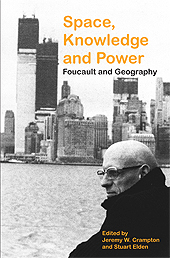While we were in Chicago, Jeremy Crampton and I discussed our edited book, Space, Knowledge and Power: Foucault and Geography, which has been chosen by Ashgate as one of their most important books. You can listen to the recording of our brief (14 minute) discussion at the Ashgate blog.
 Posted by Emily Ferro, Marketing Coordinator
Posted by Emily Ferro, Marketing Coordinator
Space, Knowledge and Power: Foucault and Geography by Jeremy Crampton and Stuart Elden has been chosen by our editors as having played a significant part in the building and reputation of our Geography list. In the years since publication, the authors have had a chance to reflect on their work and the process of publishing.
This book takes a close look at the work of Michel Foucault, featuring contributions by key figures such as David Harvey, Chris Philo, Sara Mills, Nigel Thrift, John Agnew, Thomas Flynn and Matthew Hannah. In the podcast below, recorded in Chicago, at the Swissôtel, the editors of this influential book discuss their experiences and motivations in publishing their work. They also reflect on the impact their research has had, and look to future endeavors.
To hear about the authors’ experiences, you can listen to the podcast here:
For…
View original post 28 more words

$134.96
(Regular price: $149.95)
Yes, in hardback. But follow the link to the paperback and it’s more affordable. http://www.ashgate.com/default.aspx?page=637&edition_id=6214&calcTitle=1 As we say in the podcast, ensuring paperback was essential for us when we signed the contract.
yes thanks i appreciate that but what are the publishers doing to libraries?
It’s hard to know how to respond – I think you are picking on the wrong target. Jeremy and I insisted on a paperback, which was and is affordable. For a book that is 8 years old it’s still a similar price, instead of an inflated print-on-demand option. this was not a cheap book to produce – rights for the translations were not free, and the translator was paid. He was a grad student at the time. Ashgate paid for all that.
Libraries can, and frequently do, buy paperback and sometime have this bound for durability. Paperback price plus binding must be cheaper than hardback prices. There are so many books with inflated prices without a cheaper option that complaining about this one seems misplaced. I share your concerns about prices, and since my one book that appeared only in hardback – which was a misjudgment – i have always insisted on a paperback clause. (The exception was an edited major reference work that reprinted material.) Hope that helps explain things.
Pingback: Interview with Stuart Elden on our book | Open Geography
Pingback: Top posts on Progressive Geographies this week | Progressive Geographies